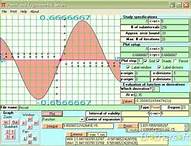
Numerical differentiation deals with the calculation of derivatives of a smooth function:
defined on a discrete
set of grid points (x0, x1, x2... xN).
The construction of numerical approximations of the derivatives is based on finite difference formalisms.
One approach we use is
the use of Taylor series approximations. The Taylor series expansion method has the advantage of providing information about
the error involved in the approximation. The McLaurin series expansion techniques will also yield similar approximations.
Finite Difference Formulas
The derivation of the finite difference approximations for the derivatives of f(x) is based on forward and backward Taylor
series expansion of f(x) about x, such as:
f(x + h) = f(x) + hf'(x) + h2/2! f''(x) + h3/3! + f'''(x) + h4/4! f(4)(x) + ...
f(x - h) = f(x) - hf'(x) + h2/2! f''(x) - h3/3! + f'''(x) + h4/4! f(4)(x) - ...
f(x + 2h) = f(x) + 2hf'(x) + (2h)2/2! f''(x) + (2h)3/3! + f'''(x) + (2h)4/4! f(4)(x) + ...
f(x - 2h) = f(x) + 2hf'(x) + (2h)2/2! f''(x) - (2h)3/3! + f'''(x) + (2h)4/4! f(4)(x) - ... |
|
where h = Δx. From the above equations, one can easily obtain the sums and differences of the series:
f(x + h) + f(x - h) = 2f(x) + h2 f''(x) + h4/12 f(4)(x) + ...
f(x + h) - f(x - h) = 2hf'(x) + h3/3 f'''(x) + ...
f(x + 2h) + f(x - 2h) = 2f(x) + 4h2 f''(x) + 4h4/3 f(4)(x) + ...
f(x + 2h) - f(x - 2h) = 4hf'(x) + 8h3/3 f'''(x) + ... |
Note the sums contains only even derivatives, whereas the differences contain only odd derivatives. The above equations can
be regarded as coupled equations that can be solved for various derivatives of f(x). The number of equations involved and the number
of terms kept in each equation depend on the order of the derivative and the desired degree of accuracy.
Please select from the menu →
NUMERICAL DIFFERENTIATION (press to select)
|